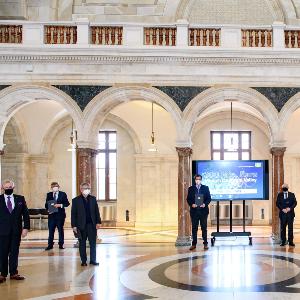Munich Quantum Valley
11 Jan 2021
LMU President Bernd Huber signs letter of intent for new research initiative
11 Jan 2021
LMU President Bernd Huber signs letter of intent for new research initiative

© Bayerische Staatskanzlei
The Bavarian Government has announced its intention to fund a new research alliance in the field of quantum sciences. In addition to LMU Munich and the Technical University of Munich (TUM), three non-university research organizations – the Bavarian Academy of Sciences (BADW), the Fraunhofer Association and the Max Planck Society (MPG) – will also participate in the venture. Subject to the approval of the Bavarian Parliament, the State Government has earmarked a total of 300 million euros for the project, of which 120 million euros will be provided over the period 2021-2022.
Among the goals which researchers in the new Munich Quantum Valley will pursue are the construction of a quantum computer that vastly outperforms the classical digital computers now in use, the creation of secure communications networks, and the design of the basic elements of quantum technologies. The partners have now signed a formal memorandum of understanding, which confirms their commitment to the realization of this important collaborative project.
“We warmly welcome this initiative,” says LMU President Prof. Bernd Huber. “Munich is one of the world’s important centers for quantum sciences, and LMU is one of its driving forces. Our collaborative Cluster of Excellence, the "The Munich Center for Quantum Science and Technology", brings together highly respected researchers in this field. The new Munich Quantum Valley will provide a further significant boost for quantum sciences in the region.”
On the picture from left to right: Prof. Dr. Reimund Neugebauer (President of the Fraunhofer Association), Prof. Dr. Bernd Huber (President of LMU), Prof. Dr. Thomas O. Höllmann (President of the BADW), Dr. Markus Söder (Prime Minister of Bavaria), Prof. Dr. Martin Stratmann (President of the MPG), Prof. Dr. Thomas F. Hofmann (President of TUM), Bernd Sibler (Minister for Research) and Hubert Aiwanger (Minister for Economic Affairs).
A three-point plan encompassing research, development and training
Over the coming decade, the partners involved in the venture plan to expedite the development of quantum sciences and quantum-based technologies at both national and international levels. To achieve this goal, they have formulated a three-point plan, with the aim of intensifying existing research, development and training programs in quantum science. The plan envisages the establishment of a Center for Quantum Computing and Quantum Technologies (ZQQ) and a Quantum Technology Park, as well as the strengthening of educational and training opportunities for both junior academics and specialists in industry. These programs will make the Munich region even more attractive for highly qualified professionals in the field of quantum science.
The ZQQ will select priority areas for research and development in quantum technologies, and coordinate the allocation of resources for especially promising projects. In addition, over the next few years the ZQQ intends to construct a quantum computer that is capable of solving problems that are beyond the capacity of even the best conventional supercomputers. In the longer term, these efforts are expected to lead to the design of commercially viable quantum computers.
In the planned Quantum Technology Park, the Munich Quantum Valley consortium will set up the high-tech infrastructure that research groups, start-ups and established firms need in order to move quantum technologies forward on an international scale. This element of the project will make it possible for research findings to be rapidly translated into innovative products.
Pending approval of the initiative by the Bavarian Parliament, the Bavarian Government plans to devote a total of 300 million euros to the project, of which 120 million will be made available as start-up funding during 2021 and 2022. The collaboration will also apply for financial support from the Federal Government, which has allocated some 2 billion euros to the development of quantum technologies as part of its 2020 economic stimulus package (Zukunftspaket Deutschland).